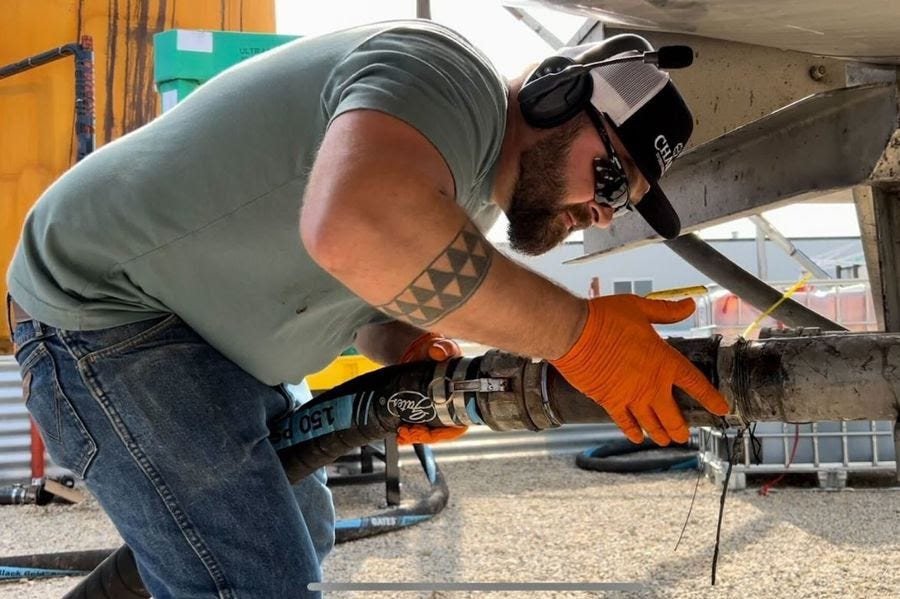“A New Approach to the Carbon Market, By Ed Ballard, Wall Street Journal
Conflicts of Interest abound in the Carbon Markets.
A New Approach to the Carbon Market
By Ed Ballard
Charm Industrial locks up carbon by injecting oil made from biological waste into old oil wells. Photo: Charm Industrial
Limiting global warming could require removing billions of tons of carbon dioxide from the atmosphere every year. A lot needs to go right.
For a start, whoever is paying for the carbon removal needs to be confident that it is actually happening.
This has been a problem for the carbon market. Many projects that sold credits based on promises to protect trees overstated their impact. Sometimes trees burned down, or logging moved to another patch of forest. Buyers have grown wary.
One person trying to rebuild trust in the market is Eamon Jubbawy, founder of Isometric, a company pitching a new process for vetting carbon projects.
His previous company, Onfido, also traded on trust. It sold machine-learning software that banks use to scan photos of people opening accounts to detect fraudsters.
Isometric is also trying to guard against fraud—only it’s scrutinizing messy real-world processes, not just computer files.
Isometric recently certified credits issued by carbon-removal startup Charm Industrial representing 107 metric tons of CO2. Charm previously agreed to sell the credits to payments companies Stripe and Shopify and to JPMorgan Chase.
Charm uses waste from farms and forestry operations to produce carbon-rich liquid and injects it into old oil wells, where it should stay for millennia. The waste would otherwise have broken down, adding carbon to the air.
The company says it has captured more than 7,000 tons of carbon. Its method is among a diverse range of carbon-removal approaches. For now they are expensive: Charm typically charges around $600 per ton of carbon, around 100 times what cheap credits can cost. Like other carbon-removal startups it is focused on bringing costs down.
Isometric is among a handful of players trying to impose some order.
The validation followed two years of effort as Isometric developed a system for checking that what works in theory is really happening.
Some puzzles were technical. Charm’s machine for converting biomass into oil emits some carbon as exhaust gas, so sensors track those losses. Isometric logs other emissions, such as the miles driven by delivery trucks.
Ripple effects are trickiest. There’s a risk that extra demand for waste could spur more corn production—which generates a lot of emissions. For that reason, Isometric’s protocol says companies using corn waste for bio-oil can’t get it from farmers who only just started growing it.
Isometric pitches transparency (you can browse its project database) and scientific rigor (it employs 15 scientists; many more vet its protocols) as reasons to trust the credits it endorses.
Different incentives
The biggest differentiator is how Isometric gets paid. The carbon registries that certify most carbon offsets are paid by developers of carbon projects on a per-credit basis. That creates a potential conflict—the more credits the registries endorse, the more money they get.
Isometric is paid to count carbon by credit buyers, and the fee doesn’t depend on how many credits it eventually approves. “It’s a pretty deep, transformational change as to how carbon markets and verification work,” said Peter Reinhardt, Charm’s founder.
Early on, he added, Charm had to improvise verification methods. In 2021, an Oklahoma well operator held a video call with Stripe to show Charm’s bio-oil being injected underground. For carbon removal to take off, such ad-hoc processes won’t cut it.
Jubbawy says conflicts of interest can’t be eliminated, only managed. But he’s betting that carbon removal can be trustworthy enough for the world to buy it.
Tell me what you think: Send your feedback and suggestions to ed.ballard@wsj.com. And if somebody forwarded you this email, you can subscribe here.






Consider watching and sharing